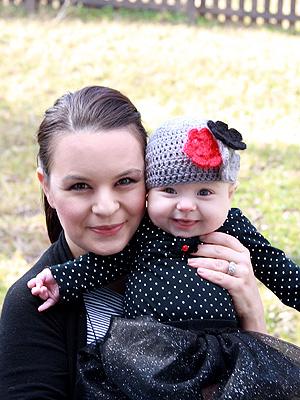
Cuddling with Gray – Courtesy Jenna von Oy
Celebrity blogger Jenna von Oy is a new mama!
Best known for her roles as Six on Blossom and Stevie on The Parkers, von Oy is also a musician who has released two albums and is set to publish a book, The Betweeners.
von Oy, 35, wed Brad Bratcher on Oct. 10, 2010, and resides in Nashville with her husband and five dogs.
They welcomed their first child, daughter Gray Audrey, on May 21. She is now almost 7 months old.
In her latest blog, von Oy reflects on the trials and tribulations of teething.
You can find her on Facebook and Twitter @JennavonOy, as well as posting on her weekly blog, The Cradle Chronicles.
Author’s Note: The tragedy on December 14th in my hometown of Newtown, Conn. continues to weigh heavily on my heart, as it always will. In light of it, I considered leaving my mommy blog unpublished this month; it is difficult to look beyond the grief and sorrow right now. Though I wrote this post well before the horrific incident at Sandy Hook, I wasn’t sure I was ready to offer you fun, tongue-in-cheek anecdotes about my daughter’s teething woes in the midst of such a trying time.
It is hard not to let the profound sadness overshadow everything else. But it dawns on me that this is when we need love and laughter most. It’s one of the ways we pick ourselves up and move forward, even when it appears impossible. It is one of the ways we show one another support. So I’m doing my best to find the little things that make me smile through the pain, and my daughter has been a stunning light in all of the darkness. I treasure these moments with her now, even more than before.
My heart is forever with those who lost their lives in such a violent and senseless act. As parents, I imagine every one of us is grieving in our own way right now, so I hope this month’s blog will make you smile in the middle of your pain too … if even for a moment. — Jenna
We have entered the Twilight Zone, more popularly known as: teething. It is a warped world of twisted tales and meltdowns, where one never knows if something sinister is hiding around an otherwise innocuous corner. What lurks in the shadows is often scarier than the threat one can see. For example, consider our flight to Los Angeles in October. We were preparing to head west for my little sister’s wedding, and the plane ride loomed over us menacingly.
For three evenings prior to our trip, my daughter was in teething hell, beginning at around 6 p.m. … exactly the hour our flight was scheduled to depart. Go figure! And we’re talking epic saga screaming sessions here; the poor girl wailed until she passed out from exhaustion. It was devastating for my husband and I, because there’s only so much a parent can do to ease aching gums. We felt helpless. At some point we had to take a deep breath, check our sanity at the door, and realize it’s all part of the growth process — ours as well as hers.
Needless to say, the prospect of being in a confined space (for just shy of five hours), with a potentially screaming baby, was less than thrilling. In all honesty, I’d rather have a root canal than deal with fellow passengers who are furious over a fussy baby … make that my fussy baby. Sure, I’ve heard about the folks who dole out candy to their cabin-mates as a preemptive strike. Truthfully, I’m lucky I made it out the door with my matron-of-honor dress in tow, much less a dispensable goodie bag for people I’ve never met and will likely never see again.
I’m not suggesting I don’t care about their feelings — I probably care TOO much, in fact. But there’s something about bribing folks to pretend they don’t hear my child moaning in misery that disturbs me. I have to hope the simple words, “My daughter is in pain right now” accompanied by a sincere, “Thank you for your understanding” will suffice. But I digress.
The apprehension was overwhelming as we counted down the minutes until the impending debacle. But you know what? My sweet little girl surprised us by sleeping the whole way to California. And she smiled the entire way back home! My pre-flight paranoia stressed me out far more than the flight itself. As I said before, you just never know what’s lurking in the shadows. Every now and then, I guess it winds up being something better than expected.
It amazes me just how much a few little teeth can alter the reality I’ve come to know over the last seven months. The child who was (miraculously) allowing us to sleep through the night is suddenly waking up three or four times to comfort nurse. Or, as I prefer to call it, she has begun “whining and dining.”
Though I’ve tried offering diversions, Gray isn’t interested in any of it. She’s got a one-track mind and it’s focused on the milk dispenser. That said, I’m happy to let her nurse more often if it’s reducing her suffering. The side effect of this is, of course, that I tend to resemble a zombie for the majority of the morning … or at least until I’ve had a large enough dose of caffeine to sufficiently resurrect my brain function.

Gray’s giraffe affinity – Courtesy Jenna von Oy
Another byproduct of the seemingly endless teething adventure seems to be a serious bout with separation anxiety. Gray has unexpectedly become very vocally opposed to being left with anyone else, which often includes my husband. And by that, I mean that I can’t walk out of the room without her bellowing like a banshee. Those moments typically give way to macaroni and cheese dinners, since they don’t easily allow for easy meal preparation. Or showering. Or writing a blog, for that matter.
When being more than two feet away from the “breastaurant” sends your child into spasmodic fits of shrieking and squawking, one tends to stick close to home and find every possible way to avoid the social purgatory.
There are definitely moments when no remedy, homeopathic or otherwise, seems to satisfy the teething demons. Other times, I find it merely requires the art of distraction. We’ve taken to trying every silly antic we can conjure up. This includes, but certainly isn’t limited to: making ridiculous faces, speaking in wacky cartoon voices, banging pots and pans and wildly dancing around our kitchen. I’m becoming the one-woman show no one wants to see.
So that I can reserve some of my “entertainment skills” for career opportunities, we recently invested in one of those baby activity walkers. This is much to the dismay of our pups, who bolt out of the room as soon they hear our daughter plunking away on the plastic piano keys. Our house is now filled with the cacophony of tinny children’s songs, farm noises, and dogs howling. Investing in a decent set of earplugs is sounding better and better every day.
Not that they would save me from myself, mind you … I currently have an obsession with turning everything into a catchy ditty. Brushing my teeth has become a performance worthy of Carnegie Hall, and you should hear my diaper changing song — there are multiple verses! Clearly, if I’m aggravating myself with my made up tunes, my poor husband must have the patience of Mother Teresa.
On the slightly less annoying side, we’ve strung up a bouncy seat in our kitchen doorframe, and Gray jumps around to her heart’s content. It’s as if we’ve given birth to our very own kangaroo.
Our house isn’t exempt from the fun either — every surface is coated with a thin layer of drool and, for once, I can’t credit our Basset Hound. Each room is currently strewn with a plethora teething toys, all of which somehow seem to be giraffe-related, and which my husband and I lunge for at the slightest whimper of crankiness. Gray doesn’t seem to discriminate.
In a pinch, we’ve found that an ice-cold washcloth is just as soothing to her as its more expensive, store-bought counterparts. You know when your child seems more preoccupied by the box the toy came in than the toy itself? It’s the same idea.
I recently Tweeted that dealing with a teething baby is the equivalent of playing badminton with firecrackers. I can’t say I’ve changed my mind about that. At times, it can be unpredictably explosive. That said, though the teething process is anxiety-laden for everyone involved, I must say my daughter is a trooper. More often than not, she is in good spirits and smiles through it all. I’m exceedingly thankful for that. She’s one stubborn kid, that’s for sure!
I’d like to think she knows we’re in this thing together … even when I do the crazy chicken dance, or sing stupid songs about tying my shoes.
Until next time,
– Jenna von Oy
More from Jenna’s PEOPLE.com blog series:













